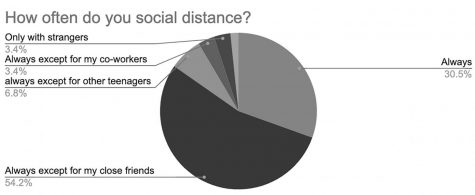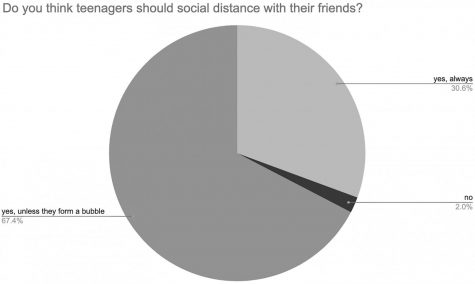31% of Urban students social distancing during COVID-19
The ongoing pandemic, which hit the United States this march, has transformed how Urban students socialize with one another. Teenagers must now balance the importance of keeping themselves and their loved ones safe from COVID-19 with the need for meaningful human interaction. Urban students’ resulting social distancing practices have been varied, reflecting the different familial and self-imposed guidelines that people follow to minimize risk.
According to the “stay-safer-at-home” order issued by the San Francisco Department of Public Health, all residents are encouraged to stay at home and are required to stay 6 ft apart when possible. All residents must also wear masks while in public. Despite this order, in a sample survey of 49 Urban students with a 13% margin of error, 67% said that they think teenagers should be able to intimately see their close group of friends, aka their “bubble.”

What is a quarantine bubble? An anonymous senior notes that there is a disparity surrounding how people define what a quarantine bubble is, which can defeat its purpose. “I would say it’s an agreement between a group of people that you are only seeing them and that outside of that bubble, they’re keeping themselves safe,” she said.
An anonymous junior agrees that people have been defining what a bubble is in different ways. She has noticed that teenagers are taking advantage of bubbles, using the idea of a bubble to drop social distancing with their close friends who also aren’t social distancing with other people. “It’s kind of like the STI thing,” she said. “When you’re having sex with one person you’re having sex with all the people they had sex with. So when you make a bubble with one person you’re basically making a bubble with all the people they’ve interacted with.”
On the other hand, many Urban students have chosen to remain socially distant from all their friends at all times. From the sample survey, 31% of students said that they think teenagers should always comply with social distancing guidelines during social interactions.

The anonymous junior is one of the 31%. “I always kind of keep in the back of my mind that COVID is disproportionately affecting black and brown communities, so I honestly feel like it’s inherently racist to not consider other people when you lack social distancing,” she said.
The anonymous senior has also been very conscious about how she social distances. “I think it’s always in the back of my mind that like this affects the community, and if I can do my part, I should and will,” she said.“I’m also really afraid of giving other people COVID.”
While social distancing is important, many Urban students have felt isolated from not being able to physically touch their friends. “I feel good about the choices that I’m making about social distancing, but it also kind of makes me feel alone,” said the anonymous junior. She has noticed that physical touch is how she shows affection and feels connected. “I say all this shit and then when I’m in the moment I’m like I really want to give you a hug right now and I can’t.”
The anonymous senior agrees, feeling that the lack of physical contact is isolating. “I think my love language is physical touch,” she said, adding that she especially misses hugging her friends.
Another anonymous senior discussed how his mother feels that there is a balance between physical health and mental health, worrying that the mental cost of quarantine and missing out on a hug will be greater than the potential physical cost of COVID-19. “She’s worried I don’t have enough friends, and she values that over my health. She knows that I’m not at risk, so [she thinks] it’s okay to make that sacrifice,” he said.
In preparation for returning to hybrid Urban, students must ensure that their behaviors are adjusted in order to comply with the student pledge. “Going back to Hybrid Urban, I think it’s time to reconsider. It’s unfair to teachers and other students who are just trying to get their education,” said another anonymous junior who currently is a part of an expanding bubble of Urban students. “I don’t want to break like the trust we have in the Urban community and I think it’s going to be a new expectation that people are more careful.”

